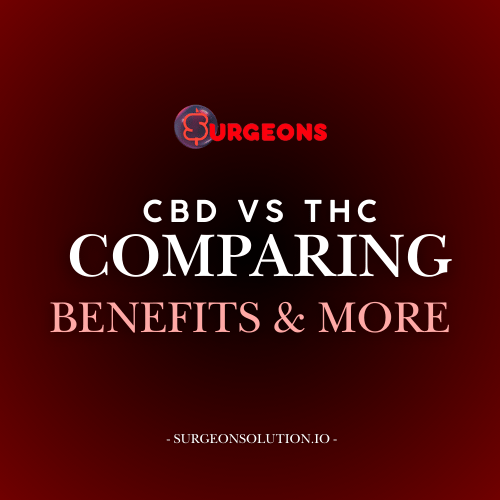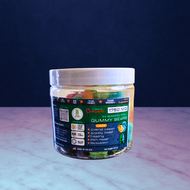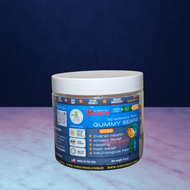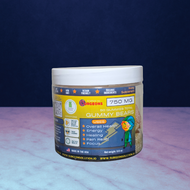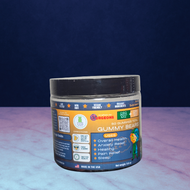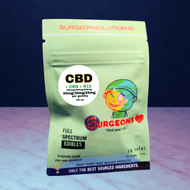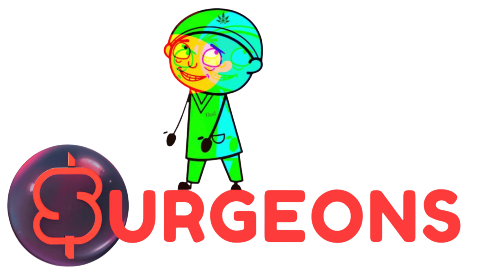Surgeons Online Cannabinoid Academy
CBD vs. THC: Differences, Benefits, and Uses of Cannabinoids
Introduction
CBD (cannabidiol) and THC (tetrahydrocannabinol) are two of the most well-known compounds derived from the cannabis plant, yet they offer unique effects and benefits. As cannabinoids, both CBD and THC interact with the body’s endocannabinoid system to promote wellness, but they do so in different ways. CBD is widely recognized for its calming and non-intoxicating effects, making it a popular choice for those seeking relaxation without a high. THC, on the other hand, is known for its psychoactive properties that can create a euphoric experience.
With the increasing popularity of cannabinoid products, understanding the differences between CBD and THC is essential. This guide explores how each cannabinoid works, their unique effects, therapeutic uses, legal status, and considerations for choosing the right product to meet individual wellness goals.
What Are Cannabinoids?
Cannabinoids are naturally occurring compounds found in the cannabis plant that interact with the body’s endocannabinoid system (ECS) to support various aspects of wellness. The ECS is a complex cell-signaling system that plays a role in regulating essential functions like mood, appetite, sleep, and immune response. By interacting with cannabinoid receptors in the ECS, cannabinoids such as CBD and THC can influence these functions, offering therapeutic effects that have led to their growing popularity.
While CBD and THC are the most well-known cannabinoids, the cannabis plant actually contains over 100 different cannabinoids, each with unique properties and potential health benefits. Unlike THC, which is known for its psychoactive effects, CBD is non-intoxicating and is often used for relaxation, stress relief, and physical recovery without the “high.” Understanding the role of cannabinoids and how they work in the body can help users make informed choices about which products best align with their wellness goals.
CBD: Benefits, Effects, and Uses
CBD, or cannabidiol, is a non-intoxicating cannabinoid widely recognized for its calming effects and potential therapeutic benefits. Unlike THC, CBD doesn’t produce a “high,” making it a popular choice for individuals looking to manage stress, anxiety, and physical discomfort without psychoactive effects. CBD interacts with receptors in the endocannabinoid system, promoting balance in various bodily functions, including mood, sleep, and immune response.
One of the primary uses of CBD is for stress relief and relaxation. Many users find that CBD helps promote a sense of calm, which can be beneficial for managing everyday stress. Additionally, CBD is frequently used to support physical recovery and reduce inflammation, making it appealing for post-workout recovery or managing chronic discomfort. CBD is also used to improve sleep quality, with many users incorporating it into their nightly routines to unwind and achieve more restful sleep.
CBD products come in various forms, including oils, tinctures, capsules, and topicals, offering flexibility for different preferences and needs. Whether taken sublingually for quick absorption or applied topically for targeted relief, CBD’s versatility allows users to tailor their experience to match specific wellness goals.
THC: Benefits, Effects, and Uses
THC, or tetrahydrocannabinol, is the primary psychoactive compound found in cannabis and is responsible for the “high” associated with marijuana use. Unlike CBD, THC binds directly to receptors in the brain’s endocannabinoid system, creating euphoric and psychoactive effects. While often associated with recreational use, THC also has therapeutic applications that can make it beneficial for individuals seeking relief from various physical and psychological symptoms.
One of the primary therapeutic uses of THC is in pain relief. THC’s interaction with pain receptors can reduce discomfort and inflammation, making it a popular choice for those dealing with chronic pain conditions. Additionally, THC is known to stimulate appetite, which is particularly helpful for individuals experiencing appetite loss due to medical treatments or conditions. Another common use of THC is for sleep support, as its relaxing effects can help individuals fall asleep more easily and achieve deeper rest.
THC products come in various forms, including edibles, oils, vapes, and topicals, allowing users to choose a consumption method that aligns with their preferences. Due to its psychoactive nature, it’s essential for new users to start with a low dose to gauge their tolerance and minimize potential side effects, such as dizziness or dry mouth.
Key Differences Between CBD and THC
While both CBD and THC are cannabinoids derived from the cannabis plant, they have distinct effects and applications. One of the primary differences is their psychoactivity: THC is psychoactive and produces the “high” commonly associated with cannabis, while CBD is non-intoxicating and does not produce any euphoric effects. This makes CBD a popular choice for those seeking wellness benefits without altering their state of mind.
Another key difference lies in their therapeutic uses. CBD is often used for relaxation, stress relief, and supporting overall balance within the body. It’s widely chosen by individuals looking for a calming effect without the high. In contrast, THC is frequently used for pain relief, appetite stimulation, and as a sleep aid, particularly beneficial for those experiencing severe symptoms due to chronic conditions. These unique properties make each cannabinoid suitable for different wellness goals.
The legal status of CBD and THC also varies, with CBD being federally legal in the United States when derived from hemp, while THC’s legality depends on state regulations due to its psychoactive nature. Understanding these differences can help individuals make informed decisions based on their personal wellness needs and legal considerations.
Legal Status of CBD vs. THC
The legal status of CBD and THC varies significantly, primarily due to their differing effects and psychoactivity. In the United States, CBD derived from hemp is federally legal under the 2018 Farm Bill, as long as it contains no more than 0.3% THC. This regulation has allowed for widespread access to CBD products across most states, making it easy for individuals to explore its wellness benefits without legal concerns.
In contrast, THC’s legality is more complex. Due to its psychoactive properties, THC is classified as a controlled substance at the federal level, making it illegal in states without specific medical or recreational cannabis laws. However, many states have enacted legislation to allow the use of THC for medicinal or recreational purposes, creating a patchwork of regulations across the country. Individuals interested in THC should be aware of their state’s specific laws, as access to THC products can vary widely depending on location.
Understanding these legal differences can help individuals make informed choices when considering CBD or THC products. While CBD is widely accessible and typically unrestricted, THC requires more careful consideration based on state and federal regulations.
Side Effects and Considerations
When exploring CBD and THC, it’s essential to consider potential side effects and how each cannabinoid may interact with the body differently. CBD is generally well-tolerated, with mild side effects like dry mouth, dizziness, or changes in appetite in some users. Because CBD is non-intoxicating, these side effects are often minimal and do not impair cognitive function, making it a suitable option for daily use.
THC, on the other hand, can produce more noticeable side effects due to its psychoactive properties. Common side effects of THC include dry mouth, red eyes, dizziness, increased heart rate, and in some cases, anxiety or paranoia, especially at higher doses. Individuals new to THC should start with a low dose to gauge their tolerance and minimize these effects. It’s also important to consider potential interactions with medications, as both CBD and THC can influence how certain drugs are metabolized in the body.
For those interested in cannabinoids, consulting with a healthcare provider is a wise step, especially if you have pre-existing health conditions or are taking other medications. Understanding the possible side effects and considerations can help users make informed decisions about whether CBD, THC, or a combination of both is the best fit for their wellness goals.
Conclusion
CBD and THC, the two most prominent cannabinoids, each offer unique benefits and effects that make them suitable for different wellness goals. While CBD is non-intoxicating and often used for stress relief, relaxation, and physical recovery, THC provides psychoactive effects that can be useful for pain relief, appetite stimulation, and sleep support. Understanding the key differences between CBD and THC—from their effects and legal status to potential side effects—can help users make informed decisions about which cannabinoid best suits their needs.
As the popularity of cannabinoids continues to grow, it’s important to start with a low dose, consider any health factors, and consult with a healthcare provider if necessary. Both CBD and THC offer valuable options for natural wellness, allowing individuals to choose a path that aligns with their lifestyle and wellness goals.

